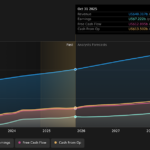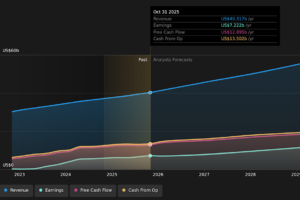<p class="canvas-atom canvas-text Mb(1.0em) Mb(0)–sm Mt(0.8em)–sm" type="text" content="Recently, e-commerce platform specialist Shopify (NYSE: SHOP) made a surprise announcement of its own network of fulfillment centers — a move that would put the company in direct competition with Amazon.com (NASDAQ: AMZN). Of course, having its own fulfillment network doesn’t automatically make Shopify a meaningful Amazon rival. One analyst, however, believes that Shopify can, with the help of its fast-growing e-commerce platform and rapid pace of innovation, morph into a rival over time. Indeed, this possible outcome helped prompt the analyst to raise his price target for the stock by $50.” data-reactid=”11″>Recently, e-commerce platform specialist Shopify (NYSE: SHOP) made a surprise announcement of its own network of fulfillment centers — a move that would put the company in direct competition with Amazon.com (NASDAQ: AMZN). Of course, having its own fulfillment network doesn’t automatically make Shopify a meaningful Amazon rival. One analyst, however, believes that Shopify can, with the help of its fast-growing e-commerce platform and rapid pace of innovation, morph into a rival over time. Indeed, this possible outcome helped prompt the analyst to raise his price target for the stock by $50.
Is the analyst onto something? Or is his outlook too speculative?


Image source: Shopify.
<h2 class="canvas-atom canvas-text Mb(1.0em) Mb(0)–sm Mt(0.8em)–sm" type="text" content="Rivaling Amazon” data-reactid=”25″>Rivaling Amazon
<p class="canvas-atom canvas-text Mb(1.0em) Mb(0)–sm Mt(0.8em)–sm" type="text" content=""Industry conference feedback is overwhelmingly positive [for Shopify]," wrote KeyBanc Capital Markets analyst Josh Beck on Sunday (via Barron’s). More specifically, the analyst cited "a lot of buzz" concerning the company’s recently unveiled Shopify Fulfillment Network. This positive industry sentiment, along with Shopify’s mobile-centric e-commerce platform, impressive innovation, and strong partner ecosystem, could ultimately help the company rival Amazon, Beck predicts.” data-reactid=”26″>”Industry conference feedback is overwhelmingly positive [for Shopify],” wrote KeyBanc Capital Markets analyst Josh Beck on Sunday (via Barron’s). More specifically, the analyst cited “a lot of buzz” concerning the company’s recently unveiled Shopify Fulfillment Network. This positive industry sentiment, along with Shopify’s mobile-centric e-commerce platform, impressive innovation, and strong partner ecosystem, could ultimately help the company rival Amazon, Beck predicts.
<p class="canvas-atom canvas-text Mb(1.0em) Mb(0)–sm Mt(0.8em)–sm" type="text" content="Backing up his confidence in the company, Beck raised his 12-month price target for the stock to $350, up from a previous target for $300. The analyst also reaffirmed his overweight rating for shares.” data-reactid=”27″>Backing up his confidence in the company, Beck raised his 12-month price target for the stock to $350, up from a previous target for $300. The analyst also reaffirmed his overweight rating for shares.
It’s true that Shopify has been innovating at a rapid pace. The company announced a host of major updates at its annual Shopify Unite conference last month. Along with the announcement of its own fulfillment network, Shopify unveiled a new online store design, 11 new language capabilities, and an overhauled Shopify Plus platform.
Further, Shopify’s business has been growing by leaps and bounds. Total gross merchandise volume on its platform soared to $41.1 billion in 2018, up 56% year over year.
<h2 class="canvas-atom canvas-text Mb(1.0em) Mb(0)–sm Mt(0.8em)–sm" type="text" content="A lofty aspiration” data-reactid=”30″>A lofty aspiration
Despite Shopify’s strong momentum and its impressive suite of new platform upgrades, the company has a long way to go to rival Amazon. Sure, Shopify’s plan to spend $1 billion to set up a network of fulfillment centers in the U.S. is aggressive for a company that had less than $1.1 billion in revenue in 2018. But Amazon is a behemoth — and scale is the name of the game in e-commerce, so size matters. Amazon has over 175 fulfillment centers, altogether covering over 150 million square feet. In North America alone, Amazon has 110 buildings in its logistics network, supporting over 250,000 employees.
Further, Amazon is investing massive sums of money every year to keep expanding. In 2017 and 2018 Amazon spent $12.0 billion and $13.4 billion, respectively, on property and equipment. While not all of this capital went to Amazon’s fulfillment network, management said in its most recent 10-K that expenditures related to building additional fulfillment capacity are one of the primary drivers of this capital outlay (alongside investments to build out the technology infrastructure for its cloud computing business).
Finally, given that Amazon’s bottom line in 2018 came in at $10.1 billion while Shopify’s was -$65 million, you can bet Amazon is prepared to spend a little more if necessary in order to thwart new competition.
Of course, Shopify does have an advantage in its value proposition as an independent fulfillment network. Unlike Amazon, Shopify doesn’t compete with its merchants by bringing to market its own private-label brands. But this advantage isn’t enough for investors to start pricing in meaningful inroads with its new fulfillment network. Investors should instead look for tangible traction after the fulfillment network is operating at scale before betting Shopify can rival the e-commerce giant.
<p class="canvas-atom canvas-text Mb(1.0em) Mb(0)–sm Mt(0.8em)–sm" type="text" content=" More From The Motley Fool ” data-reactid=”35″> More From The Motley Fool
<p class="canvas-atom canvas-text Mb(1.0em) Mb(0)–sm Mt(0.8em)–sm" type="text" content="John Mackey, CEO of Whole Foods Market, an Amazon subsidiary, is a member of The Motley Fool’s board of directors. Daniel Sparks has no position in any of the stocks mentioned. The Motley Fool owns shares of and recommends Amazon and Shopify. The Motley Fool has a disclosure policy.” data-reactid=”43″>John Mackey, CEO of Whole Foods Market, an Amazon subsidiary, is a member of The Motley Fool’s board of directors. Daniel Sparks has no position in any of the stocks mentioned. The Motley Fool owns shares of and recommends Amazon and Shopify. The Motley Fool has a disclosure policy.










